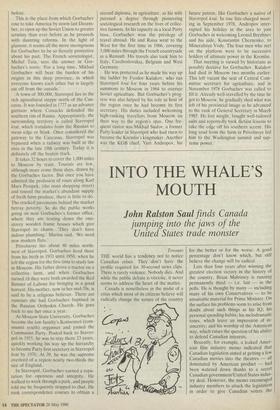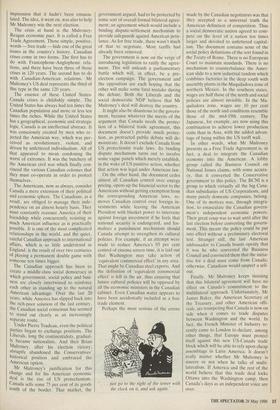INTO THE WHALE'S MOUTH
John Ralston Saul finds Canada jumping into the jaws of the United States trade monster
Toronto THE world has a tendency not to notice Canadian crises. They don't have the profile required for 30-second news clips. There is rarely violence. Nobody dies. And while the public debate is vitriolic, it never seems to address the heart of the matter.
Canada is nonetheless in the midst of a crisis which most of its citizens believe will radically change the nature of the country for the better or for the worse. A good percentage don't know which, but still believe the change will be radical.
Less than four years after winning the greatest election victory in the history of the country, Brian Mulroney is running permanently third — i.e. last — in the polls. He is thought by many — including many of his own Conservatives — to be unsuitable material for Prime Minister. On the surface his problems seem to arise from doubt about such things as his IQ; his personal spending habits; his melodramatic tones, which leave an impression of in- sincerity; and his worship of the American way, which raises the question of his ability to defend Canadian interests.
Recently, for example, a leaked Amer- ican film industry memo indicated that Canadian legislation aimed at getting a few Canadian movies into the theatres — all dominated by American product — had been watered down thanks to a secret Canadian government/United States indus- try deal. However, the memo encouraged industry members to attack the legislation in order to give Canadian voters the impression that it hadn't been emascu- lated. The idea, it went on, was also to help Mr Mulroney win the next election.
The crisis at hand is the Mulroney- Reagan economic pact. It is called a Free Trade Agreement. Those simple, positive, words — free trade — hide one of the great issues in the country's history. Canadian crises come in two forms. The first has to do with Francophone-Anglophone rela- tions, and there have been three of those crises in 120 years. The second has to do with Canadian-American relations. Mr Mulroney's US deal represents the third of this type in the same 120 years.
The essence of these United States- Canada crises is childishly simple. The United States has always had ten times the Canadian population and more or less ten times the riches. While the United States has a geographical, economic and strategic logic, Canada is an intellectual abstract. It was consciously created by men who re- jected the American way, which was per- ceived as revolutionary, violent, and driven by unfettered individualism. All of that appeared to mean condoning the worst of extremes. It was the butchery of the American civil war which finally con- vinced the various Canadian colonies that they must co-operate in order to protect themselves.
The Americans, now as always, consider Canada a mere extension of their political and economic sphere. The Canadians, as a result, are obliged to manage their inde- pendence on an almost hourly basis. They must constantly reassure America of their friendship while concurrently resisting as much American influence as is practically possible. It is one of the most complicated relationships in the world, and the quiet, careful Canadian approach to international affairs, which is so little understood in England, is the result of over two centuries of playing a permanent double game with someone ten times bigger.
The Canadian approach has been to create a middle-class social democracy in which government, social policy and busi- ness are closely intertwined to reinforce each other in standing up to the natural American advantage. Over the last 20 years, while America has slipped back into the rich-poor solution of the last century, the Canadian social consensus has seemed to stand out clearly as an increasingly separate route.
Under Pierre Trudeau, even the political parties began to exchange positions. The Liberals, long the continentalists, gradual- ly became nationalists. And then Brian Mulroney, after his election victory, abruptly abandoned the Conservatives' historical position and embraced the American option. Mr Mulroney's justification for this change and for his American economic deal is the rise of US protectionism. Canada sells some 75 per cent of its goods south of the border. That market, the government argued, had to be protected by some sort of overall formal bilateral agree- ment; an agreement which would include a binding dispute-settlement mechanism to provide safeguards against American petu- lance. As for free trade, there wasn't much of that to negotiate. Most tariffs had already been removed.
The government is now on the verge of introducing legislation to ratify the agree- ment. This will unleash a parliamentary battle which will, in effect, be a pre- election campaign. The government and the opposition are each hoping that the other will make some fatal mistake during the debate. Both the Liberals and the social democratic NDP believe that Mr Mulroney's deal will destroy the country.
It might also be disastrous to the govern- ment, because whatever the merits of the argument that Canada needs the protec- tion of a bilateral trade agreement, this document doesn't provide much protec- tion, as protracted public debate will de- monstrate. It doesn't exclude Canada from US protectionist trade laws. Its binding dispute mechanism turns out to involve some vague panels which merely establish, in the wake of US punitive action, whether that action was legal under American law.
On the other hand, the document cedes almost all Canadian control over energy pricing, opens up the financial sector to the Americans without getting exemption from the corresponding American laws, re- moves Canadian control over foreign in- vestments while leaving the American President with blanket power to intervene against foreign investment if he feels that national security is endangered, and for- malises a punishment mechanism should Canada attempt to strengthen its cultural policies. For example, if an attempt were made to reduce America's 93 per cent control of cinema screen time, it is laid out that Washington may take action of 'equivalent commercial effect' in any area. That might be Canadian steel exports. And the definition of 'equivalent commercial effect' is left in the air, thus ensuring that future cultural policies will be opposed by all the economic ministers in the Canadian cabinet. Even Canadian water appears to have been accidentally included as a free trade element.
Perhaps the most serious of the errors ' . . . just go to the right of the tower with the clock on it, and ask again.' made by the Canadian negotiators was that they accepted as a universal truth the American definition of competition. Thus a social .democratic nation agreed to com- pete on the level of a nation ten times larger and devoted to unfettered capital- ism. The document contains none of the social policy definitions of the sort found in the Treaty of Rome. There is no European Court to maintain standards. There is no mechanism to counterbalance the Amer- ican slide to a new industrial tandem which combines factories in the deep south with assembly plants in the Maquiladora zone of northern Mexico. In the southern states, wages are half those of the north and social policies are almost invisible. In the Ma- quiladora zone, wages are 10 per cent those of the north and conditions resemble those of the mid-19th century. The Japanese, for example, are now using this combination to achieve lower production costs than in Asia, with the added advan- tage of being within the US tariff wall.
In other words, what Mr Mulroney presents as a Free Trade Agreement is, in fact, a deal to integrate the Canadian economy into the American. A lobby group called the Business Council on National Issues claims, with some accura- cy, that it converted the Conservative government to this policy. The BCNI is a group to which virtually all the big Cana- dian subsidiaries of US Corporations, and many purely domestic companies, belong. One of its motives was, through integra- tion, to emasculate the Canadian govern- ment's independent economic powers. Their great coup was to wait until after the last election before converting the govern- ment. This meant the policy could be put into effect without a preliminary electoral test. Stranger still, the last American ambassador to Canada boasts openly that it was he who converted the Business Council and convinced them that the initia- tive for a deal must come from Canada: otherwise, Canadians would suspect a sell- out.
Finally, Mr Mulroney keeps insisting that this bilateral agreement will have no effect on Canada's commitment to the multilateral approach. Unfortunately, Mr James Baker, the American Secretary of the Treasury, and other American offi- cials, are trumpeting that Canada is now on side when it comes to trade disputes between Washington and the world. In fact, the French Minister of Industry re- cently came to London to declare, among other things, that Europe must protect itself against this new US-Canada trade block which will be able to rely upon cheap assemblage in Latin America. It doesn't really matter whether Mr Mulroney is sincere or not when he talks of multi- lateralism. If America and the rest of the world believe that this trade deal locks Ottawa into the Washington camp, then Canada's days as an independent voice are over.



















































 Previous page
Previous page